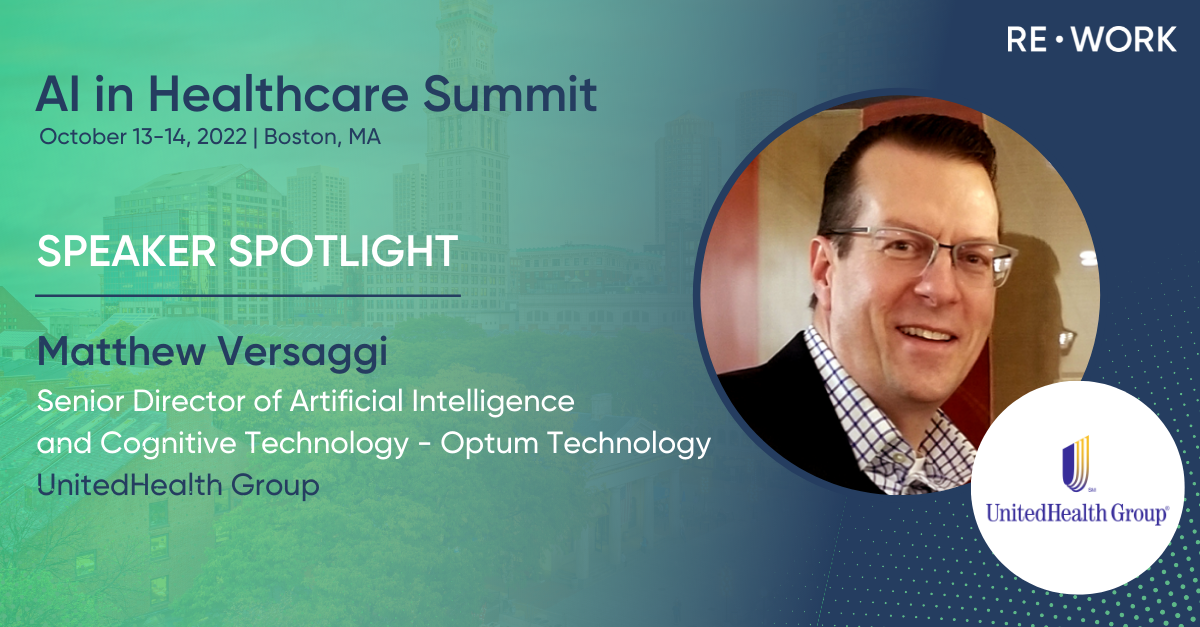Quantum Computing has transformed the healthcare industry by rapidly advancing medical research and technologies. From this, medical analysis has progressed at an extreme tempo. Ahead of the RE•WORK - AI in Healthcare Summit Boston, we asked Matthew Versaggi, Senior Director of AI/CT + Distinguished Engineer - Optum Technology at UnitedHealth Group his thoughts on the topic. Here's what he had to say:
What do you think is the most important advancement for AI in healthcare?
"AI in general is comprised of many different technologies that currently operate independently to solve specific problems. We will witness a fusion of many of these disparate AI technologies into a more advanced AI that will be able to solve many of the intractable problems that healthcare considers unsolvable today."
What do you think will be AI’s crowning achievement for healthcare and patient outcomes?
"There are actually many – for example, AI is already diagnosing depression and anxiety from a 1-minute verbal interaction in nearly any language. But it’s overall crowning achievement will likely be in the value-based care space where AI helps prevents illness from appearing in the first place, and arrests the decline of patients who do get sick by holistic methods of intervention, monitoring, and patient engagement."

What are some recent wins from an AI project you are working on? What challenges did you face during it? How did you overcome them?
"We see a lot of AI projects, but our most exciting wins come from the use of a different type of AI called Cognitive technology (cognitive architectures) that are modeled after the mechanics of the human brain and brings computational cognition (like biological cognition) to the table to solve problems that require sophisticated reasoning over context. The challenge is that cognitive architectures are not trained like ML models, they are taught from structured knowledge instead, which is really a knowledge engineering problem of pulling knowledge out of the heads of SMEs. We overcame this problem in the clinical space by leveraging ontologies and other vehicles of systematically curating structured knowledge."
How engrained will AI be in the clinical workflow 5 to 10 years from now? What will some future trends be then?
"I believe it will be heavily ingrained within that time span. The trends will be to alleviate the clinician of the data entry burden inherent in today's healthcare IT systems, to move the heavy lifting of remedial analysis to the AI, and permit the clinician to work with real-time, 24/7 results of key health data of their patients, and permit healthcare, in general, to scale personalized medicine on a right time, right place, right therapy, at the right price basis."
What are you most looking forward to while speaking at the AI in Healthcare Summit?
"Interacting with peers, connecting with new colleagues, and sharing our experiences in the AI, Cognitive Technology, and Quantum Computing spaces."
Want to learn more?
Matthew will be speaking at the upcoming AI in Healthcare Summit on October 13-14, 2022, in Boston, MA. Join him and many other AI/ML and Deep Learning experts to learn more about the latest trends and opportunities in healthcare.
Standard Passes end on Friday, September 30, so book your place today.
For more information, contact [email protected].
